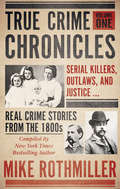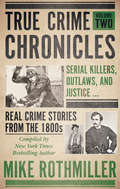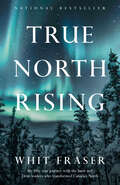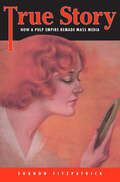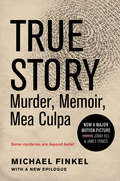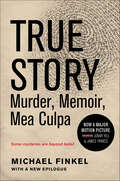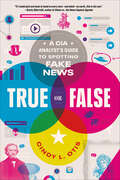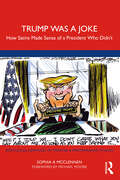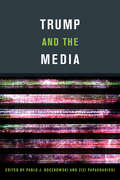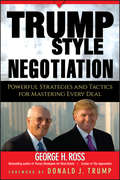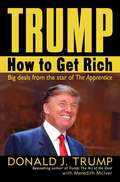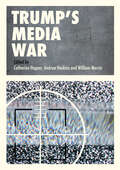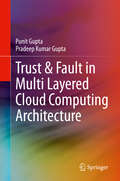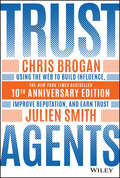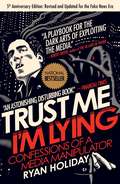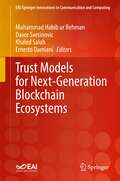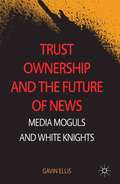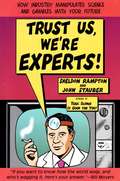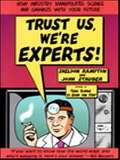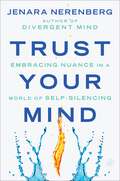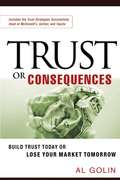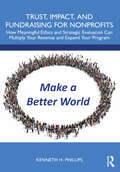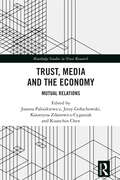- Table View
- List View
True Crime Chronicles, Volume One: Serial Killers, Outlaws, and Justice ... Real Crime Stories From The 1800s
by Mike RothmillerOriginal newspaper reports of Wyatt Earp, Belle Gunness, Billy the Kid, Dr. H.H. Holmes, and others compiled by the New York Times–bestselling author. Former detective and bestselling author Mike Rothmiller has brought together classic works of journalism that will take the reader back to when these horrific tales mesmerized a nation. Some may find these articles and their descriptions of people and crimes shocking by today&’s standards, but they are representative of the most colorful true crime stories of the day. True Crime Chronicles, Volume One includes stories about Belle Gunness, who had a penchant for killing men and feeding them to her hogs, Dr. Holmes and his &“murder castle,&” The Bloody Benders, and Amelia Dyer, the &“baby farmer,&” the darker side of Wyatt Earp, and the forerunners of the American Mafia, &“The Black Hand.&” Imagine yourself accompanying these reporters visiting the crime scenes, interviewing witnesses, and penning the stories of murder, lynchings, evil, and swift frontier justice.
True Crime Chronicles, Volume Two: Serial Killers, Outlaws, and Justice ... Real Crime Stories From The 1800s
by Mike RothmillerNewspaper reports of Jack the Ripper, Jesse James, Butch Cassidy and the Sundance Kid, and others compiled by the New York Times–bestselling author. Former detective and bestselling author Mike Rothmiller has brought together classic works of journalism that will take the reader on a fascinating journey back in time to when these horrific tales mesmerized a nation. Some may find these articles and their descriptions of people and crimes shocking by today&’s standards, but they are representative of the most colorful true crime stories of the dayTrue Crime Chronicles, Volume Two includes stories about Billy the Kid, Jesse James, the legendary &“Jack the Ripper,&” Lizzie Halliday, Anna Maria Zwanziger, Jack the Haircutter, Butch Cassidy and the Sundance Kid, The Nebraska Murderer, and many more shocking stories. Follow along as these reporters from another century visit the crime scenes, interview witnesses, and pen the stories of murder, evil, and swift frontier justice.
True North Rising: My fifty-year journey with the Inuit and Dene leaders who transformed Canada's North
by Whit FraserIn this captivating memoir, Whit Fraser weaves scenes from more than fifty years of reporting and living in the North with fascinating portraits of the Dene and Inuit activists who successfully overturned the colonial order and politically reshaped Canada—including his wife, Mary Simon, Canada's first Indigenous governor general."This is a huge embrace of a book, irresistible on every level. . . . I couldn't put it down." —Elizabeth Hay, Scotiabank Giller prize-winning author of Late Nights on AirIn True North Rising, Whit Fraser delivers a smart, touching and astute living history of five decades that transformed the North, a span he witnessed first as a longtime CBC reporter and then through his friendships and his work with Dene and Inuit activists and leaders. Whit had a front-row seat at the MacKenzie Valley Pipeline inquiry, the constitutional conferences and the land-claims negotiations that successfully reshaped the North; he's also travelled to every village and town from Labrador to Alaska. His vivid portraits of groundbreakers such as Abe Okpik, Jose Kusugak, Stephen Kakfwi, Marie Wilson, John Amagoalik, Tagak Curley, and his own wife, Mary Simon, bring home their truly historic achievements, but they also give us a privileged glimpse of who they are, and who Whit Fraser is. He may have begun as a know-nothing reporter from the south, but he soon fell in love with the North, and his memoir is a testament to more than fifty years of commitment to its people.
True Story: How a Pulp Empire Remade Mass Media
by Shanon FitzpatrickThe larger-than-life story of Bernarr Macfadden, a bodybuilder who turned his obsession with muscles, celebrity, and confession into a publishing empire that transformed global media.In True Story, Shanon Fitzpatrick tells the unlikely story of an orphan from the Ozarks who became one of history’s most powerful media moguls. Born in 1868 in Mill Spring, Missouri, Bernarr Macfadden turned to bodybuilding to transform himself from a sickly “boy” into a creature of masculine perfection. He then channeled his passion into the magazine Physical Culture, capitalizing on the wider turn-of-the-century mania for fitness. Macfadden Publications soon become a pioneer in mass media, helping to inaugurate our sensational, confessional, and body-obsessed global marketplace.With publications like True Story, a magazine purportedly written and edited by its own readers, as well as scores of romance, crime, and fan magazines, Macfadden specialized in titles that targeted women, immigrants, and the working class. Although derided as pulp by critics of the time, Macfadden’s publications were not merely profitable. They were also influential. They championed reader engagement and interactivity long before these were buzzwords in the media industry, breaking down barriers between producers and consumers of culture. At the same time, Macfadden Publications inspired key elements of modern media strategy by privileging rapid production of new content and equally rapid disintegration and reconfiguration of properties in the face of shifting market conditions.No less than the kings of Hollywood and Madison Avenue, Macfadden was a crucial player in shaping American consumer culture and selling it to the world at large. Though the Macfadden media empire is overlooked today, its legacies are everywhere, from true-crime journalism to celebrity gossip rags and fifteen-minute abs.
True Story: Murder, Memoir, Mea Culpa
by Michael FinkelIn the haunting tradition of Joe McGinniss's Fatal Vision and Mikal Gilmore's Shot in the Heart, True Story: Murder, Memoir, Mea Culpa weaves a spellbinding tale of murder, love, and deceit with a deeply personal inquiry into the slippery nature of truth. The story begins in February of 2002, when a reporter in Oregon contacts New York Times Magazine writer Michael Finkel with a startling piece of news. A young, highly intelligent man named Christian Longo, on the FBI's Ten Most Wanted list for killing his entire family, has recently been captured in Mexico, where he'd taken on a new identity-Michael Finkel of the New York Times. The next day, on page A-3 of the Times, comes another bit of troubling news: a note, written by the paper's editors, explaining that Finkel has falsified parts of an investigative article and has been fired. This unlikely confluence sets the stage for a bizarre and intense relationship. After Longo's arrest, the only journalist the accused murderer will speak with is the real Michael Finkel. And as the months until Longo's trial tick away, the two men talk for dozens of hours on the telephone, meet in the jailhouse visiting room, and exchange nearly a thousand pages of handwritten letters. With Longo insisting he can prove his innocence, Finkel strives to uncover what really happened to Longo's family, and his quest becomes less a reporting job than a psychological cat-and-mouse game-sometimes redemptively honest, other times slyly manipulative. Finkel's pursuit pays off only at the end, when Longo, after a lifetime of deception, finally says what he wouldn't even admit in court-the whole, true story. Or so it seems.
True Story: Murder, Memoir, Mea Culpa
by Michael FinkelIn the haunting tradition of Joe McGinniss's Fatal Vision and Mikal Gilmore's Shot in the Heart, True Story: Murder, Memoir, Mea Culpa weaves a spellbinding tale of murder, love, and deceit with a deeply personal inquiry into the slippery nature of truth.The story begins in February of 2002, when a reporter in Oregon contacts New York Times Magazine writer Michael Finkel with a startling piece of news. A young, highly intelligent man named Christian Longo, on the FBI's Ten Most Wanted list for killing his entire family, has recently been captured in Mexico, where he'd taken on a new identity--Michael Finkel of the New York Times.The next day, on page A-3 of the Times, comes another bit of troubling news: a note, written by the paper's editors, explaining that Finkel has falsified parts of an investigative article and has been fired. This unlikely confluence sets the stage for a bizarre and intense relationship. After Longo's arrest, the only journalist the accused murderer will speak with is the real Michael Finkel. And as the months until Longo's trial tick away, the two men talk for dozens of hours on the telephone, meet in the jailhouse visiting room, and exchange nearly a thousand pages of handwritten letters.With Longo insisting he can prove his innocence, Finkel strives to uncover what really happened to Longo's family, and his quest becomes less a reporting job than a psychological cat-and-mouse game--sometimes redemptively honest, other times slyly manipulative. Finkel's pursuit pays off only at the end, when Longo, after a lifetime of deception, finally says what he wouldn't even admit in court--the whole, true story. Or so it seems.
True Story: Murder, Memoir, Mea Culpa
by Michael FinkelIn the haunting tradition of Joe McGinniss's Fatal Vision and Mikal Gilmore's Shot in the Heart, True Story: Murder, Memoir, Mea Culpa weaves a spellbinding tale of murder, love, and deceit with a deeply personal inquiry into the slippery nature of truth.The story begins in February of 2002, when a reporter in Oregon contacts New York Times Magazine writer Michael Finkel with a startling piece of news. A young, highly intelligent man named Christian Longo, on the FBI's Ten Most Wanted list for killing his entire family, has recently been captured in Mexico, where he'd taken on a new identity--Michael Finkel of the New York Times.The next day, on page A-3 of the Times, comes another bit of troubling news: a note, written by the paper's editors, explaining that Finkel has falsified parts of an investigative article and has been fired. This unlikely confluence sets the stage for a bizarre and intense relationship. After Longo's arrest, the only journalist the accused murderer will speak with is the real Michael Finkel. And as the months until Longo's trial tick away, the two men talk for dozens of hours on the telephone, meet in the jailhouse visiting room, and exchange nearly a thousand pages of handwritten letters.With Longo insisting he can prove his innocence, Finkel strives to uncover what really happened to Longo's family, and his quest becomes less a reporting job than a psychological cat-and-mouse game--sometimes redemptively honest, other times slyly manipulative. Finkel's pursuit pays off only at the end, when Longo, after a lifetime of deception, finally says what he wouldn't even admit in court--the whole, true story. Or so it seems.
True Story: Murder, Memoir, Mea Culpa
by Michael FinkelThe improbable but true story of a man accused of murdering his entire family and the journalist he impersonated while on the runIn 2001, Mike Finkel was on top of the world: young, talented, and recently promoted to a plum job at the New York Times Magazine. Then he made an irremediable slip: Under extraordinary pressure to keep producing blockbuster stories, he fabricated parts of an article. Caught and excommunicated from the Times, he retreated to his home in Montana, swearing off any contact with the media. When the phone rang, though, he couldn’t resist. At the other end was a reporter from the San Francisco Chronicle, whom Finkel congratulated on being the first in what was sure to be a long and bloodthirsty line of media watchdogs. The reporter was puzzled. In Waldport, Oregon, Christian Longo had killed his young wife and three children and dumped their bodies into the bay. With a stolen credit card, he fled south, making his way to Cancun, where he lived for several weeks under an assumed identity: Michael Finkel, journalist for the New York Times. True Story is the tale of a bizarre and convoluted collision between fact and fiction, and a meditation on the slippery nature of truth. When Finkel contacts Longo in jail, the two men begin a close and complex relationship. Over the course of a year, they exchange long letters and weekly phone calls, playing out a cat-and-mouse game in which it’s never quite clear if the pursuer is Finkel or Longo—or both. Finkel’s dogged pursuit of the true story pays off only at the end, in the gripping trial scenes in which Longo, after a lifetime of deception, finally tells the whole truth. Or so he says.
True or False: A CIA Analyst's Guide to Spotting Fake News
by Cindy L. Otis"If I could pick one book to hand to every teen—and adult—on earth, this is the one. True or False is accessible, thorough, and searingly honest, and we desperately needed it." —Becky Albertalli, author of Simon vs. the Homo Sapiens Agenda A former CIA analyst unveils the true history of fake news and gives readers tips on how to avoid falling victim to it in this highly designed informative YA nonfiction title. "Fake news" is a term you’ve probably heard a lot in the last few years, but it’s not a new phenomenon. From the ancient Egyptians to the French Revolution to Jack the Ripper and the founding fathers, fake news has been around as long as human civilization. But that doesn’t mean that we should just give up on the idea of finding the truth.In True or False, former CIA analyst Cindy Otis will take readers through the history and impact of misinformation over the centuries, sharing stories from the past and insights that readers today can gain from them. Then, she shares lessons learned in over a decade working for the CIA, including actionable tips on how to spot fake news, how to make sense of the information we receive each day, and, perhaps most importantly, how to understand and see past our own information biases, so that we can think critically about important issues and put events happening around us into context.True or False includes a wealth of photo illustrations, informative inserts, and sidebars containing interesting facts and trivia sure to engage readers in critical thinking and analysis.This title has common core connections.
Trump Was a Joke: How Satire Made Sense of a President Who Didn’t (Routledge Advances in Theatre & Performance Studies)
by Sophia A McclennenWritten by a scholar of satire and politics, Trump Was a Joke explains why satire is an exceptional foil for absurd political times and why it did a particularly good job of making sense of Trump. Covering a range of comedic interventions, Trump Was a Joke analyzes why political satire is surprisingly effective at keeping us sane when politics is making us crazy. Its goal is to highlight the unique power of political satire to encourage critical thinking, foster civic action, and further rational debate in moments of political hubris and hysteria. The book has been endorsed by Bassem Youssef, who has been referred to as the “Jon Stewart of Egypt,” and Srdja Popovic, author of Blueprint for Revolution, who used satirical activism to bring down Serbian dictator Slobodan Milosevic. With a foreword by award-winning filmmaker, satirist, and activist Michael Moore, this study will be of interest to readers who follow politics and enjoy political comedy and will appeal to the communications, comedy studies, media studies, political science, rhetoric, cultural studies, and American studies markets.
Trump and the Media
by Zizi Papacharissi Pablo BoczkowskiThe election of Donald Trump and the great disruption in the news and social media. Donald Trump's election as the 45th President of the United States came as something of a surprise—to many analysts, journalists, and voters. The New York Times's The Upshot gave Hillary Clinton an 85 percent chance of winning the White House even as the returns began to come in. What happened? And what role did the news and social media play in the election? In Trump and the Media, journalism and technology experts grapple with these questions in a series of short, thought-provoking essays. Considering the disruption of the media landscape, the disconnect between many voters and the established news outlets, the emergence of fake news and “alternative facts,” and Trump's own use of social media, these essays provide a window onto broader transformations in the relationship between information and politics in the twenty-first century. The contributors find historical roots to current events in Cold War notions of "us" versus "them," trace the genealogy of the assault on facts, and chart the collapse of traditional news gatekeepers. They consider such topics as Trump's tweets (diagnosed by one writer as “Twitterosis”) and the constant media exposure given to Trump during the campaign. They propose photojournalists as visual fact checkers (“lessons of the paparazzi”) and debate whether Trump's administration is authoritarian or just authoritarian-like. Finally, they consider future strategies for the news and social media to improve the quality of democratic life. Contributors Mike Ananny, Chris W. Anderson, Rodney Benson, Pablo J. Boczkowski, danah boyd, Robyn Caplan, Michael X. Delli Carpini, Josh Cowls, Susan J. Douglas, Keith N. Hampton, Dave Karpf, Daniel Kreiss, Seth C. Lewis, Zoey Lichtenheld, Andrew L. Mendelson, Gina Neff, Zizi Papacharissi, Katy E. Pearce, Victor Pickard, Sue Robinson, Adrienne Russell, Ralph Schroeder, Michael Schudson, Julia Sonnevend, Keren Tenenboim-Weinblatt, Tina Tucker, Fred Turner, Nikki Usher, Karin Wahl-Jorgensen, Silvio Waisbord, Barbie Zelizer
Trump-Style Negotiation
by George H. RossEver since he wrote The Art of the Deal, Trump has been the world's most famous negotiator--even though he didn't reveal his actual deal-making secrets. Now, George Ross explains the tactics that too Trump to the top and how you can use those same tactics and strategies in your daily negotiations. A practical, real-world negotiation playbook, this is the ultimate guide for anyone who wants to negotiate like a proven winner.
Trump: How to Get Rich
by Donald J. Trump Meredith McIverFirst he made five billion dollars.Then he made The Apprentice.Now The Donald shows you how to make a fortune, Trump style.HOW TO GET RICHReal estate titan, bestselling author, and TV impresario Donald J. Trump reveals the secrets of his success in this candid and unprecedented book of business wisdom and advice. Over the years, everyone has urged Trump to write on this subject, but it wasn’t until NBC and executive producer Mark Burnett asked him to star in The Apprentice that he realized just how hungry people are to learn how great personal wealth is created and first-class businesses are run. Thousands applied to be Trump’s apprentice, and millions have been watching the program, making it the highest rated debut of the season.In Trump: How To Get Rich, Trump tells all–about the lessons learned from The Apprentice, his real estate empire, his position as head of the 20,000-member Trump Organization, and his most important role, as a father who has successfully taught his children the value of money and hard work.With his characteristic brass and smarts, Trump offers insights on how to• invest wisely• impress the boss and get a raise• manage a business efficiently• hire, motivate, and fire employees• negotiate anything• maintain the quality of your brand• think big and live largePlus, The Donald tells all on the art of the hair!With his luxury buildings, award-winning golf courses, high-stakes casinos, and glamorous beauty pageants, Donald J. Trump is one of a kind in American business. Every day, he lives the American dream. Now he shows you how it’s done, in this rollicking, inspirational, and illuminating behind-the-scenes story of invaluable lessons and rich rewards.
Trump’s Media War
by Andrew Hoskins William Merrin Catherine HapperThe election of Donald Trump as US President in 2016 seemed to catch the world napping. Like the vote for Brexit in the UK, there seemed to be a new de-synchronicity – a huge reality gap – between the unfolding of history and the mainstream news media’s interpretations of and reporting of contemporary events. Through a series of short, sharp interventions from academics and journalists, this book interrogates the emergent media war around Donald Trump. A series of interconnected themes are used to set an agenda for exploration of Trump as the lynch-pin in the fall of the liberal mainstream and the rise of the right media mainstream in the USA. By exploring topics such as Trump’s television celebrity, his presidential candidacy and data-driven election campaign, his use of social media, his press conferences and combative relationship with the mainstream media, and the question of ‘fake news’ and his administration’s defence of ‘alternative facts’, the contributors rally together to map the parallels of the seemingly momentous and continuing shifts in the wider relationship between media and politics.
Trust & Fault in Multi Layered Cloud Computing Architecture
by Pradeep Kumar Gupta Punit GuptaThis book discusses various aspects of cloud computing, in which trust and fault-tolerance models are included in a multilayered, cloud architecture. The authors present a variety of trust and fault models used in the cloud, comparing them based on their functionality and the layer in the cloud to which they respond. Various methods are discussed that can improve the performance of cloud architectures, in terms of trust and fault-tolerance, while providing better performance and quality of service to user. The discussion also includes new algorithms that overcome drawbacks of existing methods, using a performance matrix for each functionality. This book provide readers with an overview of cloud computing and how trust and faults in cloud datacenters affects the performance and quality of service assured to the users. Discusses fundamental issues related to trust and fault-tolerance in Cloud Computing;Describes trust and fault management techniques in multi layered cloud architecture to improve security, reliability and performance of the system;Includes methods to enhance power efficiency and network efficiency, using trust and fault based resource allocation.
Trust Agents: Using the Web to Build Influence, Improve Reputation, and Earn Trust
by Chris Brogan Julien SmithThe 10th Anniversary Edition of Trust Agents helps companies get back on track in their efforts to build reputation, attention, and trust In the years since authors Chris Brogan and Julien Smith first released their groundbreaking book Trust Agents, social media channels have become inundated by questionable, low-quality content. As a result, many businesses have suffered from damaged reputations and poorly performing social media initiatives. The power of social media is as strong as ever, yet businesses are struggling when trying to re-capture the trust and attention of their audience. This special 10th Anniversary Edition of Trust Agents helps companies of all kinds regain their reputation and re-establish the attention and trust of the marketplace. Celebrating a decade in print, this New York Times bestseller has been thoroughly revised and updated to reflect the new business realities of social networks and the latest digital technologies. All-new content and supplemental materials show business leaders how to attract the right kind of attention, communicate directly to specific groups, and leverage human innovation and originality in this age of Artificial Intelligence and automation. From using the latest social apps and platforms to build trusted networks of influence, to implementing laser-focused marketing strategies to cut through the digital clutter, critical information is supported by real-world examples and case studies, advanced theory, and practical, actionable guidance. This must-have guide: Provides expert advice on creating and growing brand influence Features specific strategies for small businesses, nonprofits, the hospitality industry, corporations, and more Discusses the six main tenets of trust agents and their use Explores online tools that foster better relationships, increased sales, and greater profits Explains the relationship between trust, social capital, and media The 10th Anniversary Edition of Trust Agents: Using the Web to Build Influence, Improve Reputation, and Earn Trust is a valuable source of knowledge for any organization operating in the Digital Age.
Trust Me, I'm Lying: Confessions of a Media Manipulator
by Ryan HolidayYou’ve seen it all before. A malicious online rumor costs a company millions. A political sideshow derails the national news cycle and destroys a candidate. Some product or celebrity zooms from total obscurity to viral sensation. What you don’t know is that someone is responsible for all this. Usually, someone like me. I’m a media manipulator. In a world where blogs control and distort the news, my job is to control blogs—as much as any one person can. In today’s culture… 1) Blogs like Gawker, Buzzfeed and the Huffington Post drive the media agenda. 2) Bloggers are slaves to money, technology, and deadlines. 3) Manipulators wield these levers to shape everything you read, see and watch—online and off. Why am I giving away these secrets? Because I'm tired of a world where blogs take indirect bribes, marketers help write the news, reckless journalists spread lies, and no one is accountable for any of it. I'm pulling back the curtain because I don't want anyone else to get blindsided. I’m going to explain exactly how the media really works. What you choose to do with this information is up to you. .
Trust Models for Next-Generation Blockchain Ecosystems (EAI/Springer Innovations in Communication and Computing)
by Khaled Salah Ernesto Damiani Muhammad Habib ur Rehman Davor SvetinovicThis book discusses the trust models for next-generation Blockchain ecosystems. The book provides a comprehensive discussion on various trust factors involving security, anonymization, reputation, governance, economic models, and other relevant determinants. The book covers various topics in breadth and depth. In addition, it sets the foundation to involve the readers in understanding the core theories supplemented with technical and experimental discussion. The book starts by laying out the foundations of trust models in Blockchain ecosystems. The authors then provide a study of existing trust models Blockchain networks. They then provide identification of trust factors and discuss each trust factor. The book concludes with a future outlook of trust-enabling Blockchain ecosystems.Outlines the trust models for next-generation Blockchain ecosystems;Covers the trust issues in various Blockchain ecosystems running in public, private, consortium, and cloud environments;Features issues such has privacy, security, scalability, and requirements in Blockchain.
Trust Ownership and the Future of News
by Gavin EllisCrumbling business models mean news media structures must change. Gavin Ellis explores the past and present use of newspaper trusts - drawing on case studies such as the Guardian, the Irish Times and the Pulitzer Prize winning Tampa Bay Times - to make the case for a form of ownership dedicated to sustaining high quality journalism.
Trust Us, We're Experts
by Sheldon Rampton John StauberFearless investigative journalists Sheldon Rampton and John Stauber ( Toxic Sludge Is Good for You! and Mad Cow U.S.A.) are back with a gripping expos of the public relations industry and the scientists who back their business-funded, anti-consumer-safety agendas. There are two kinds of "experts" in question--the PR spin doctors behind the scenes and the "independent" experts paraded before the public, scientists who have been hand-selected, cultivated, and paid handsomely to promote the views of corporations involved in controversial actions. Lively writing on controversial topics such as dioxin, bovine growth hormone, and genetically modified food makes this a real page-turner, shocking in its portrayal of the real and potential dangers in each of these technological innovations and of the "media pseudo-environment" created to obfuscate the risks. By financing and publicizing views that support the goals of corporate sponsors, PR campaigns have, over the course of the century, managed to suppress the dangers of lead poisoning for decades, silence the scientist who discovered that rats fed on genetically modified corn had significant organ abnormalities, squelch television and newspaper stories about the risks of bovine growth hormone, and place enough confusion and doubt in the public's mind about global warming to suppress any mobilization for action. Rampton and Stauber introduce the movers and shakers of the PR industry, from the "risk communicators" (whose job is to downplay all risks) and "outrage managers" (with their four strategies--deflect, defer, dismiss, or defeat) to those who specialize in "public policy intelligence" (spying on opponents). Evidently, these elaborate PR campaigns are created for our own good. According to public relations philosophers, the public reacts emotionally to topics related to health and safety and is incapable of holding rational discourse. Needless to say, Rampton and Stauber find these views rather antidemocratic and intend to pull back the curtain to reveal the real wizard in Oz. This is one wake-up call that's hard to resist.
Trust Us, We're Experts PA: How Industry Manipulates Science and Gambles with Your Future
by Sheldon Rampton John StauberThe authors of Toxic Sludge Is Good for You! unmask the sneaky and widespread methods industry uses to influence opinion through bogus experts, doctored data, and manufactured facts. We count on the experts. <P><P>We count on them to tell us who to vote for, what to eat, how to raise our children. We watch them on TV, listen to them on the radio, read their opinions in magazine and newspaper articles and letters to the editor. We trust them to tell us what to think, because there's too much information out there and not enough hours in a day to sort it all out.We should stop trusting them right this second.
Trust Your Mind: Embracing Nuance in a World of Self-Silencing
by Jenara NerenbergAn urgent examination of self-silencing culture and the toxic impact of groupthink, by the author of Divergent Mind and founder of The Neurodiversity Project. Nerenberg empowers readers with tools to understand the mind and navigate an increasingly polarized world, from campuses and workplaces, to the media and beyond.Connected across geography and culture via the internet, the world is both a vast, limitless landscape and an ever-shrinking echo chamber. Communication, especially discourse over free speech, is becoming increasingly divisive; one person’s right to speak comes into conflict with another seeking to prevent harm. Our tolerance for differing opinions is also narrowing. A “wrong” remark or comment, no matter how seemingly innocent, can result in banishment, and contradictory ideas spark hysteria and backlash—what is referred to as “cancel culture.” This polarization affects everyone of us—among friends and families, workplaces and communities—and threatens the fabric of society.In this timely book, Jenara Nerenberg analyzes this phenomenon of “self-silencing,” asking potent questions about how harmful groupthink has become accepted. Applying her expertise in journalism, psychology, and public health, she digs deep into urgent problems that are worsening under a culture of self-censorship, including loneliness, isolation, and polarization.But there is hope. Nerenberg offers insights for how to identify and escape groupthink and transform fear into empathy, allowing space for authentic communication that reduces—rather than causes—harm to others.
Trust or Consequences: Build Trust Today or Lose Your Market Tomorrow
by Al GolinThe recent rash of corporate scandals--and the ensuing financial ruin of companies and their stockholders -- proves that even the bluest of blue chip businesses cannot bank on the blind faith of consumers and investors. <P><P>More than ever, corporations must rebuild, restore, and strengthen bonds of trust. Al Golin has helped create trust strategies for global business leaders including The Walt Disney Company, Hewlett-Packard, McDonald's, Toyota, Owens-Corning, and many others. Trust or Consequences shows what makes such strategies work, and reveals the eye-opening results of a survey of over 700 business professionals. This essential book reveals how to: * create an effective trust strategy * determine the impact of trust issues on stakeholders * assess trust-building performance and calculate the difficulty of restoring trust * create a ""trust bank"" for saving deposits of good will to draw on as needed Trust or Consequences offers tools for identifying trust opportunities, as well as numerous inside accounts of trust-building successes and failures by high-profile organizations and leaders. Filled with provocative ideas about why many companies overlook trust issues, Trust or Consequences brings the subject to center stage -- where it must remain if companies are to regain stakeholder loyalty and competitive advantage.
Trust, Impact, and Fundraising for Nonprofits: How meaningful ethics and strategic evaluation can multiply your revenue and expand your program
by Kenneth H. PhillipsDistilling decades of leadership expertise into an effective framework, this is a practical guidebook for nonprofits around the globe, with practical recommendations for the urgently needed steps to make this a better world. Charities in the United States and NGOs globally need to overcome two glaring and persistent weaknesses in the eyes of potential donors: trustworthiness and effectiveness. After examining possible causes for these deficits, fundraising and organizational development guru Ken Phillips guides readers through the process that leads to greater trust and respect by donors, better results for beneficiaries, significantly increased funding, and better and bigger programs. Alongside helpful worksheets, he presents seven steps to make sure ethics are meaningful, eight disciplines to ensure programs achieve good results, and a communications approach to demonstrate responsibility and accountability, all interwoven with inspiring case studies from his own international experience and other organizations’ stories. Staff and volunteers at registered nonprofits around the world, as well as any individual or group raising funds more informally, will value this guide to empower organizations to win trust, raise more funds, and achieve greater program impact.
Trust, Media and the Economy: Mutual Relations (Routledge Studies in Trust Research)
by Jerzy Gołuchowski Joanna Paliszkiewicz Kuanchin Chen Katarzyna Zdanowicz-CyganiakTrust, Media and the Economy: Mutual Relations delves into the critical relationships between trust, media, and economic behavior. This book explores how trust in media influences economic decisions and how economic conditions impact media trustworthiness. Divided into two parts, it first examines the role of trust within media channels, addressing topics such as the impact of clickbait, the role of user-generated content, and trust dynamics across generations. The second part focuses on how trusted communication affects economic outcomes, discussing social media’s role in economic communication, the influence of financial influencers, and trust-based marketing.The book features case studies from around the world, including Poland, France, and the United States, providing a broad geographical perspective. It includes topical issues such as the trust dynamics in YouTube communities and greenwashing practices. The contributors’ diverse expertise ensures a comprehensive analysis that is accessible to non-specialists, making it a valuable resource for booksellers, librarians, and general readers interested in media and economics. By shedding light on these interactions, the book offers groundbreaking insights into developing more reliable media practices and stronger economic trust foundations.
